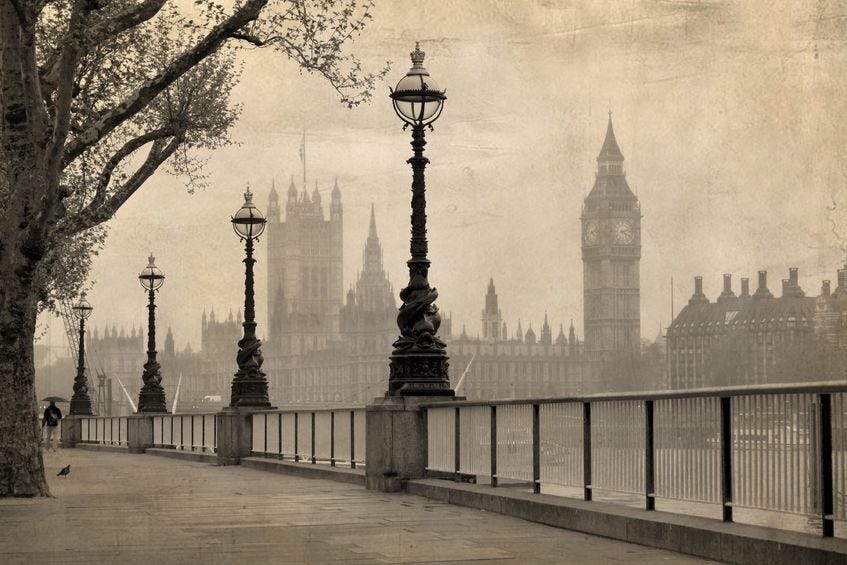Learned Helplessness, Hardship, and Imagination
Breaking the invisible chains with which we bind ourselves
For the British poet William Blake and many of his contemporaries, myriad aspects of life in the late 1700s and early 1800s were bleak. London was growing dramatically in population and prominence, yet such growth and change brought with it the hardships of poverty, disease, overcrowding, and more.
In 1794, Blake published Songs of Experience, a collection of poems that included one titled, “London.” To the best of my memory, I first read it at some point late in high school. I certainly read it during my undergraduate studies. In the poem, Blake juxtaposes the modernity he witnessed in London with its accompanying hardship, striking a dismal tone—but one with a kernel of insight that has remained with me for several decades.
I wander thro' each charter'd street,
Near where the charter'd Thames does flow.
And mark in every face I meet
Marks of weakness, marks of woe.In every cry of every Man,
In every Infants cry of fear,
In every voice: in every ban,
The mind-forg'd manacles I hearHow the Chimney-sweepers cry
Every blackning Church appalls,
And the hapless Soldiers sigh
Runs in blood down Palace wallsBut most thro' midnight streets I hear
How the youthful Harlots curse
Blasts the new-born Infants tear
And blights with plagues the Marriage hearse
Mind-Forg’d Manacles
The insight that’s stuck with me for many years from Blake’s “London” comes from the end of the second stanza, in which the narrator observes hearing “mind-forg’d manacles” amid various expressions of human suffering. The metaphor is one of chains or shackles meant to constrain one’s movement, yet they’re invisible, created in the minds of those whom they bind.
They’re restrictions on ourselves that we ourselves forge and perpetuate.
It’s similar to learned helplessness, which describes the phenomenon of humans losing their sense of agency in the face of trauma and forgetting that they retain control over how they respond to such adversity. One can think of it as passivity in the face of hardship.
Some Londoners, Blake is suggesting, had become so accustomed to their adverse circumstances that they had become unable to imagine something better. They had forged in their minds constraints on their own lives that weren’t really there.
Mere survival lacks imagination.
Surely Blake realized that some if not many of the constraints on the happiness of his poem’s characters weren’t all made up. We all have things that happen to us that we cannot control, unexpected circumstances that we cannot avoid. While some of life’s trials are self-inflicted, many others are inescapable.
And yet regardless of the type of hardship we face, it seems that learned helplessness is possible. One of the reactions we can have when life hits us in the face is to fall into the habit of thinking that we have no control over life, no control over what happens to us, and perhaps even no control over our reactions to those circumstances. That passive approach gives us no clear path forward, and it’s a grim outlook that one certainly wouldn’t characterize as flourishing.
The research seems to suggest that the way out of learned helplessness is learned control.1 This could include learning that one can control both one’s thoughts and behaviors, and such learning frequently does include both in cognitive behavior therapy. At the very least, we can learn that even amid our most inescapable and unfair moments we can control how we think.
Another way to look at the idea of learned helplessness is that passivity in the face of crisis or shock misses an opportunity. Namely, if we’re passive—thinking that nothing we do matters—we lose the chance to make ourselves better and we lose the chance to offer some hope and guidance to the rest of the world.
Amid the trials of life, for example, we always have the opportunity to be an example to others. We can help others learn from our experiences. We often can provide some guidance, even in small ways, that helps others in their times of need.
Granted, as I’ve already mentioned, plenty of things aren’t under our control. Yet in those moments when it seems like nothing is controllable, might it be worthwhile to ask ourselves: How might I think differently about this situation? How might I react differently?
Otherwise, we risk falling into the trap of self-imposed limits, an inability to see the possible, a natural inclination to bind ourselves to what we have come to know and accept.
Recognizing the possibility that our circumstances are in part forged by our minds is in and of itself helpful. It means that we aren’t simply observers of reality or characters acting out a role. It means that we have the ability to co-create reality.
We can be the change we wish to see, even if it’s in small ways.
Clearly, there are plenty of interesting themes in Blake’s poetry. But I think that a little bit of introspection about the potential presence of “mind-forg’d manacles” is a small step that can have a big impact on how we think and act.
Because if we’re capable of creating our own psychological prisons, maybe we’re also capable of setting ourselves free.
References and for further reading
Baratta, Michael V., Martin EP Seligman, and Steven F. Maier. "From helplessness to controllability: toward a neuroscience of resilience." Frontiers in Psychiatry 14 (2023): 1170417. Link
Maier, Steven F., and Martin EP Seligman. "Learned helplessness at fifty: Insights from neuroscience." Psychological Review 123, no. 4 (2016): 349-367. Link



